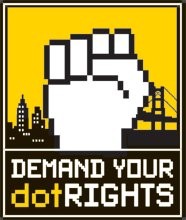A new campaign is teaching people how to stand up for their “dotRights” and avoid identity theft, unwanted snooping through emails, and even incarceration.
The dotRights campaign, headed by the American Civil Liberties Union (ACLU), is a national movement to inform internet users about the privacy risks associated with their online activities, as well as what they can do to protect themselves.
The Tennessee chapter of the organization, ACLU-TN, is focusing on a Tennessee law passed this summer that makes it a crime to post images or statements online that could be considered “emotionally distressing.”
State Representative Charles Curtiss, who sponsored the bill, said its primarily targeting people that habitually harass, offend, or threaten people through online messages and photos, also known as “cyber-bullying”.
“It has to be an intentional act. If someone posted something and didn’t intend for it to be seen by all people, that’s not violating the law,” Curtiss said.

Lindsay Kee, communications director for the ACLU-TN, said the organization considers the law unconstitutional due to its vague description of what is or isn’t offensive.
“What’s sensitive to one person is not offensive to another person. What’s art to one person might offend somebody,” Kee said.
Shelby County Commissioner Steve Mulroy, also a University of Memphis law professor, said under the First Amendment, people generally have the right to say or display things that might be viewed as offensive by others.
However, Mulroy said this doesn’t apply if one deliberately tries to threaten someone or physically intimidate them.
“The first amendment protects the communication by picture as well as the communication by word,” Mulroy said. “To say that you should have known that sending a photo could have frightened or intimidated, or caused emotional distress is too broad.”
Those that violate the law could spend up to a year in prison or receive a fine of up to $2,500. No one has yet been prosecuted for violating the law.
The national dotRights campaign is also raising awareness about the accessibility of a person’s private information online.
Facebook, Twitter, Gmail, Yahoo, Google Docs, and Youtube are among the sites that could place one’s identity at risk when providing personal information to join them.
“We’re spending so much time online these days, from web mail to photo sites to YouTube, and people don’t realize that the privacy protections they have come to expect in their personal lives offline don’t always apply in the online world,” Kee said.
Kee said the campaign isn’t designed to steer people away from online activity, but just make them more aware of the high possibility that their information is being viewed by a third party.
“Sometimes it seems like it’s just innocent conversational things that you’re putting out there, but the difference is that if you’re sitting in the coffee shop having that conversation, there’s nobody standing behind you recording it all. But online you can’t tell who’s watching and collecting that [information],” Kee said.
The Electronic Communications Privacy Act of 1986 is the current privacy law being utilized to protect those on the Internet. This law was created years before the Internet came about. Current law allows the government to access without a search warrant any web mail that’s been left in an account for more than 180 days.
“Anything that you might consider personal information that you wouldn’t want viewed, delete those emails when you’re done or don’t put them in your email in the first place,” Kee said.
The ACLU considers this a violation of the Fourth Amendment. Under that amendment, the government is required to present a warrant for searches and seizures.
Kee said until the act is updated, people can delete cookies on their computer to protect information. They can also limit online sharing of personal information and be aware of all the material they’re releasing that can be viewed by the public.
ACLU-TN launched a statewide speaking tour in early November, which made stops in Knoxville, Nashville and Memphis, that addressed technology, online free speech and privacy, and encouraged people to get involved with the campaign. For more information on how to get involved, visit: http://dotrights.org/